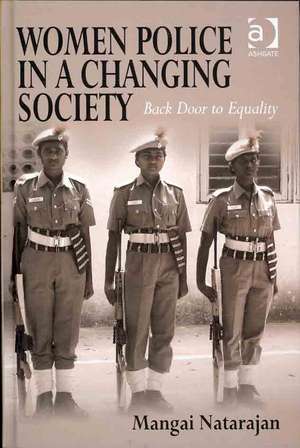Women Police in a Changing Society: Back Door to Equality
Autor Mangai Natarajanen Limba Engleză Hardback – 12 sep 2008
Preț: 822.34 lei
Preț vechi: 1104.21 lei
-26% Nou
Puncte Express: 1234
Preț estimativ în valută:
157.36€ • 162.34$ • 131.31£
157.36€ • 162.34$ • 131.31£
Comandă specială
Livrare economică 05-19 martie
Doresc să fiu notificat când acest titlu va fi disponibil:
Se trimite...
Preluare comenzi: 021 569.72.76
Specificații
ISBN-13: 9780754649328
ISBN-10: 0754649326
Pagini: 246
Dimensiuni: 156 x 234 mm
Greutate: 0.59 kg
Ediția:1
Editura: Taylor & Francis
Colecția Routledge
Locul publicării:Oxford, United Kingdom
ISBN-10: 0754649326
Pagini: 246
Dimensiuni: 156 x 234 mm
Greutate: 0.59 kg
Ediția:1
Editura: Taylor & Francis
Colecția Routledge
Locul publicării:Oxford, United Kingdom
Recenzii
'Guided by her deep respect for the daily challenges faced by women police in Tamil Nadu, Natarajan's brilliant, insightful research reaches far beyond India. This book is a must read for anyone interested in women in policing, no matter where they live or work.' Graeme R. Newman, University at Albany, New York, USA . 'Mangai Natarajan lays out a radical thesis in this important book. She argues that true gender equality in the police does not mean that men and women officers should do the same work. Instead it means that they should be assigned to duties best suited to their skills and interests, and to their lives outside the police force.' Ronald V Clarke, Rutgers University, USA 'Mangai Natarajan’s new book Women Police in a Changing Society: Back Door to Equality is a very welcome and major contribution to the field, particularly in charting the complexities of gender equity policy in policing... Her research charted an evolution in the views of women police in traditional roles towards a preference for greater integration as their experience grew and they became more confident in their ability to carry out the full range of policing duties. She therefore makes a plausible argument for a more gradual approach to the ultimate goal of gender equity in policing depending on the specific circumstances in each policing jurisdiction.' Asian Journal of Criminology
Notă biografică
Mangai Natarajan is Professor at John Jay College of Criminal Justice, City University of New York, and an Associate of the Jill Dando Institute of Crime Science at University College London.
Cuprins
Part 1 Women Police Worldwide; Chapter 1 Women Police and Societal Change; Chapter 2 Three Decades of Research on Women Police: What Has Been Learned?; Part II Women Police in a Traditional Society; Chapter 3 Women Police in India; Chapter 4 Women Police in Tamil Nadu; Part III Studies of Women Police in Tamil Nadu; Chapter 5 Tamil Nadu Women Police in the 1980s; Chapter 6 Tamil Nadu All Women Police Units'”An Assessment; Chapter 7 Women Police in the Battalions; Part IV Women Policing in a Changing Society; Chapter 8 Reconciling the Needs of the Police, Women Officers, and Tamil Nadu; Chapter 9 Prescriptions for Twenty-first Century Women Policing: Theory, Research, and Policy;
Descriere
This book offers a fascinating account of the development of women police over the past twenty years. It draws on the author's extended research in India, during a period of massive social change from a traditional society to a democratic, capitalist state. The author demonstrates how the Indian experience offers a valuable alternative model to the Anglo-American experience, not only for traditional societies but for women police in the West as well.
